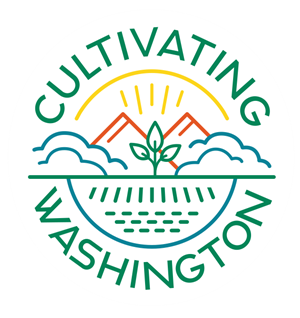Masahiro (Masa) Mukai was born on Vashon Island in 1911. Along with his father, he pioneered strawberry farming on the Puget Sound island by introducing new methods of freezing berries for sale nationwide and overseas. Masa voluntarily left the island during World War II, and returned to the family business after the war. Later he went into home and pipeline construction.
Coming to America
Mukai's parents, Denichiro and Sato, immigrated to the United States in 1885 and settled in San Francisco, where Denichiro ran an employment agency for immigrants. After the great earthquake of 1906, the couple moved north to Seattle and opened a restaurant. Denichiro later worked for a wholesale warehouse, where he learned about the strawberry business.
In 1910, the family moved to and leased land to grow strawberries. Their son Masa was born on the island in 1911. Japanese immigrants could not own property, so in 1926, when American-born Masa was 15, Denichiro bought 40 acres in his name.
As a young child, Masa was taught every aspect of his father's business. Instead of going to Japanese schools, as many children of Japanese immigrants did, Masa was schooled at the island schools. His father believed that "A boy born in America should be an American." Masa graduated from high school in 1929, and went on to study engineering at the University of Washington.
Gardens and Farming
After Masa's mother Sato died, Denichiro married her sister Kuni. Kuni designed an elaborate garden that surrounded the family house that combined traditional Japanese gardening principles and plants with Western suburban garden features such as lawns. Her tea parties, held when the cherry blossoms bloomed, were memorable social events in the community.
The Mukai's strawberry farm and processing plant became the first in the nation to experiment with freezing berries for long-distance shipment. Denichiro was active in the business until he returned to Japan in the late 1930s. When World War II broke out, he was trapped there until the fighting was over.
Masa had a friend in the United States military who tipped him off to the internment plan in 1942. Rather than being told to leave, he left his business in trustworthy hands, and moved his family to Dead Ox Flats, Idaho, and began farming there.
Although he considered himself a "voluntary evacuee," he encountered hostility and prejudice nevertheless. To counter this, he spoke at community gatherings, hoping to convey to his new neighbors that he and his family were "Americans like them."
Expanding his Business
After the war, Masa returned to Vashon Island, and picked up his business where he'd left off. His father didn't have papers to return to the states, so Masa traveled to Mexico and smuggled him over the border. Years later, Denichiro moved back to Japan, where he died in 1973.
Once back in operation, Masa discovered that the berry business wasn't as lucrative as it had been prior to the war. Prices were low, and workers were hard to find. Putting his engineering talent to good use, he expanded into the construction business, while still maintaining his Vashon plant, as well as a packing plant in Lynden, Washington. Mukai enjoyed travelling between plants, flying his own plane.
Vashon's water supply has always been sparse, owing to the fact that it is an island. After receiving his business license for construction in 1957, Mukai looked into ways of improving the water usage and distribution. He helped build a 100,000 gallon reservoir on the north end of the island, and built miles of pipeline, as well as smaller tanks near Dockton.
Historic Home
Mukai and his wife quit the packing business in 1968, to concentrate on their design and construction firm. Since their company name, Vashon Island Packing, was no longer suitable, they abbreviated it to VIPCO. For a short time, they also operated a Western Farmers Store. Later they moved to West Seattle.
In 1993, the Mukai farm on Vashon was designated a King County Landmark, and was added to the National Register of Historic Places in 1994. In 1999, the Washington state legislature set aside $150,000 for acquisition of the house and garden.
Masahiro Mukai died in his West Seattle home on October 26, 1999.
Note: This article is part of Cultivating Washington, The History of Our State’s Food, Land, and People, which includes more agriculture-related content, vidoes, and curriculum.

